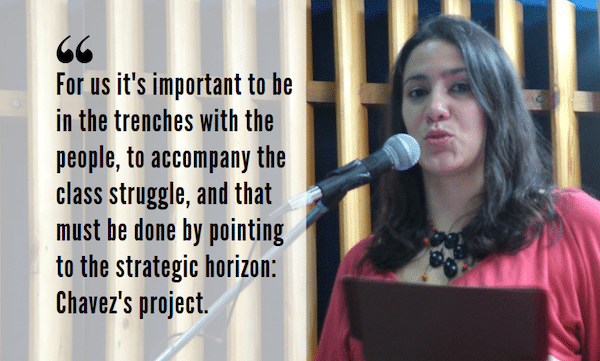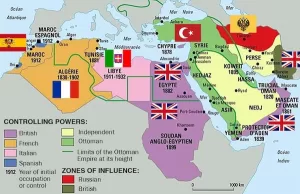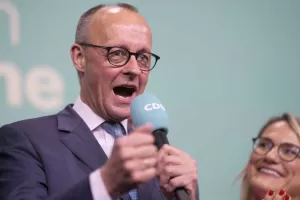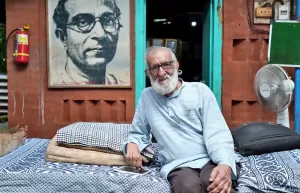Cira Pascual Marquina
[Jessica Pernia is a founding member of Tatuy TV, a community television station in the Venezuelan city of Merida. The Tatuy TV team, which is committed to defending Chavez’s communal project, produces a variety of audiovisual and written reports on the struggles of working-class Venezuelans. In this interview Pernia, also a journalism professor at the Bolivarian University, takes a critical look at the history of alternative communication in the Bolivarian Process and reflects on Tatuy’s efforts to address Venezuela’s current multi-crisis.]
Tatuy TV was born twelve years ago, at the height of the community television movement and in a context where Chavez was assuming the role of society’s great communicator and pedagogue. Since then, that remarkably democratic movement of community media has disappeared. Instead, we have an institutionalised media that is useful in the anti-imperialist struggle but has big limitations when it comes to telling the story of popular struggles. Can we talk about this process, beginning with the fascinating early wave of popular communication and going up to the present?
Indeed, there was a boom in community media beginning around 2003 that was encouraged in part by a legal framework that promoted popular communication. Those laws, together with public financing mechanisms, generated an exponential growth of media and fostered new efforts in popular communication. However, it must be acknowledged that this boom did not bring about progress in a qualitative sense. That is to say, many community media outlets were created, and they had access to resources, but their impact on popular subjectivity and social organisation left much to be desired.
Comandante Chavez was very discerning with regard to this issue, and he tried to promote a revolutionary communication system, but it didn’t take off.
At the risk of being too hard on ourselves, I would say that the present situation constitutes incontrovertible proof that the rentier mentality also penetrated the spheres of popular communication. On the one hand, many of the community media projects became dependent on institutional leadership and financing. On the other hand, the rentier attitude expressed itself in the perverse practice of consuming more resources than those produced. This happened with community media, where a community radio station might end up broadcasting another radio station all day, without producing its own content, and without accompanying processes of popular organisation (meanwhile receiving funds, which sometimes ended up in the pockets of the person in charge of the station.)
I don’t think that institutional financing is bad in itself, but if it ends up sterilising popular processes then it should be criticised. After all, the disappearance of a good part of the community media is unfortunately due to their no longer being able to capture income. We still have a lot to do!
There was a lot of money, and a great deal of equipment was distributed. There were also some important advances in developing legislation [for community media], and especially a lot of enthusiasm. But more was needed. It’s difficult to admit, but we have to face it.
After twelve years—and I’m going to be self-critical—Tatuy TV has its share of responsibility in the waning of the community television movement, and the movement of popular and alternative media in general. However, we shouldn’t forget the responsibility, too, of the many institutions, directing boards and coordinating bodies that Chavez created in the government, as well as that of the political parties, the [Great] Patriotic Pole, and the untold number of other mechanisms of integration, attention, and organisation of the revolution’s communicational project.
That a revolutionary process would [now] devote such a marginal, even minuscule role to popular media and such a trivial role to public media—while permitting private channels to be so aggressive—speaks for itself.
The Bolivarian revolution once had a sweeping grassroots communication movement, but today Tatuy TV is the only community television station that is still standing. Tatuy TV produces an impressive series of shorts called Chavez, the Radical, and it also works to give voice the struggles of the popular movement and people involved in the communes. Can you tell us about how Tatuy TV conceives of its role in communication?
I am not totally sure that we are the only television station standing or what it means to remain standing in the middle of this crisis. A case in point is that for more than four years we have been out of the radioelectric spectrum, off the air. It could be that other community TVs are still transmitting. What has disappeared, without a doubt, is the organisation around community media and their contribution to the battle of ideas.
The truth is that as far as Tatuy is concerned, we have tried to survive without losing sight of the horizon. Since we can’t transmit on the radioelectric spectrum—because we don’t have the equipment—we migrated to the electronic format, to social networks. Since there is no funding available to support our initiatives, then we look for donations, we take on odd jobs, we organise ourselves so that there is no lack of food for all of us… and when there is no electricity, then we engage in conversation and debate, we sing, we play sports, we practice photography… and yes, people are leaving the country, that is true, but we are staying put here!
We have debated a great deal about what to do in the midst of the economic, social, and political crisis that we are facing, and we have reached the conclusion that our worst enemy is neither the crisis itself, nor the opposition, nor the government—even though they all have their share of responsibility. Our worst enemy is depoliticisation.
Dammit! When a revolutionary organisation perceives that there is no interest in education, debate, political organisation, that is really scary!
What comes after the loss of faith? Fascism! For that reason, we have to throw ourselves into the project of re-politicisation, and that means recovering the spaces of struggle and organisation that we abandoned. That’s what we’ve collectively decided! Let’s go back in time! What’s the problem? If it is necessary to make cinema forums, then we will do them. If it’s time to do poetry festivals, then it will be festivals. And yes, of course, we will organise workshops and more workshops.
However, the most important thing is to never abandon the people who are themselves struggling. That should never happen. It would be unforgivable. It is now the time to be there first, on the spot even before the protagonists arrive, so that we can turn on the videocamera (lights, camera, action!). Representing reality with a view to transforming it—that’s our mantra and our praxis.
For us, it’s important to be in the trenches as a people, to accompany the class’ struggles, to show the sacrifices that are being made, to raise morale during combat… and that must always be done by pointing to the strategic horizon: the project that Chavez developed.
For us, it’s vital to turn Tatuy into a communication tool in the service of socialism and the communal state. We put our all into accompanying campesino, working-class, communal, feminist, and student struggles, and to making their voices heard in the ideological battle that is being waged.
Chavez, the Radical is extremely important in this battle because it allows us to put emphasis on the strategic horizon while reflecting on tactics. It also helps us to point out deviations in the revolutionary process. Chavez, for his part, was radically clear.
In any revolutionary process, there is an internal class struggle. In the Bolivarian Revolution, this struggle was particularly intense in the early years, but in recent times it has erupted again. Today the main struggle is between a strong sector within the government that is pushing for a neoliberal capitalist restoration while the people are in constant resistance against imperialist aggressions and the liberalisation of the economy. How do you, as communicators, address these kinds of struggles?
Look, we know that Chavismo is not uniform. There are forces in conflict within it, and we understand that reformism has made headway and assumed leadership positions that are putting at risk not only the socialist project, but also the very existence of the people who are having to pay, as always, for the consequences of the crisis.
We are thus struggling on two fronts. First, there is a battle against reformism, which is pushing us into the neoliberal abyss, sacrificing the people while doing lip service to Chavista discourse. Then, and simultaneously, there is a battle against the bourgeoisie and imperialism, which have both screwed us up over the course of history.
A little while ago, together with Venezuelanalysis, we made an audiovisual investigation into the imperial aggressions we are suffering: more than 150 unilateral sanctions against our nation! This is no game, and we demand that they end, but one thing cannot serve as a ploy to [distract us from] the other, so we have to fight on both flanks.
Tatuy is not only a media project committed to popular power, but it is also a political organisation. Can you say something about how a communication project like Tatuy ends up becoming a unit of political organisation?
The channel was just an excuse for organisation and political work! In the beginning, when Tatuy was a traveling cinema club, our slogan was: agitate, inform, organise! We always considered Tatuy TV, the television station, as what it is: un medio [Spanish word meaning both communication medium and means]. We never considered it an end in itself. Maybe that was also what helped us to adapt quickly to the new circumstances.
The goal is socialism. Everything else—including the collective discovery of reality, the new forms of solidarity that are emerging, the grasping of new ideas and the multiplication of that knowledge, and the making of knowledge into a tool for social organisation—all that is the mission that, in terms of socialist communication, a collective like us must carry out. It’s the pedagogical project of revolutionaries. That’s all.
(Cira Pascual Marquina is Political Science Professor at the Universidad de Bolivariana de Venezuela in Caracas and is staff writer for Venezuelanalysis.com.)




